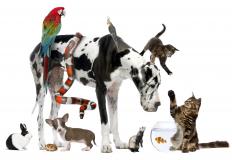 Although most people are aware of the popular career paths working with animals, such as veterinarians, groomers, and trainers, there are many more careers available that are perfect for individuals with a love of animals. One of the most thriving careers is in the area of animal psychology, which is the scientific study of animal behavior. Animal psychologists, also referred to as animal behaviorists, can specialize in many different types of animals, including fish, bids, household pets, livestock, equine, or large wild animals. The following is a detailed explanation of what an animal psychologist does and how interested individuals can get on the right track to this rewarding career.
Although most people are aware of the popular career paths working with animals, such as veterinarians, groomers, and trainers, there are many more careers available that are perfect for individuals with a love of animals. One of the most thriving careers is in the area of animal psychology, which is the scientific study of animal behavior. Animal psychologists, also referred to as animal behaviorists, can specialize in many different types of animals, including fish, bids, household pets, livestock, equine, or large wild animals. The following is a detailed explanation of what an animal psychologist does and how interested individuals can get on the right track to this rewarding career.
Animal Psychologist Job Description
In a research setting, animal psychologists apply the principles and theories surrounding animal behavior to study how animals interact with one another, the environment, and human beings. They may conduct research studies on their methods of communication, learning, group interaction, psychology, and instinctual responses to a stimulus. Within academia, animal psychologists often give lectures, supervise laboratory research activities, and conduct or publish their own studies to further knowledge in animal science. If relevant to their studies, animal psychologists need to travel to conduct naturalistic observations of the animal species in the wild.
When animal psychologists work in an application setting, they use their expertise in the mental life and behavior of animals in order to diagnose animal disorders. Often times, animal psychologists are responsible for helping solve animal disorders, health problems, living situations, and potential stresses. The animal psychologist will observe the animal, investigate whether the behavior is normal, implement a plan to resolve the problem, and conduct behavioral modifications or training.
Education and Training Requirements
Those who are interested in becoming an animal psychologist will first have to obtain a bachelor’s degree from an accredited psychology, biology, or animal science program. Although there may be some employment options with a bachelor’s degree, animal psychologists typically need to obtain an advanced master’s or doctoral degree in psychology with a concentration in behavioral science. In addition to education, animal psychologists must become licensed in the field to conduct studies with animals. Most seek the highest certification in animal psychology as a Certified Applied Animal Behaviorist (CAAB) from the Animal Behavior Society (ABS). Candidates for certification must have completed at least a master’s degree in psychology and have documented a minimum of five years of practical work experience in the field of animal behavior science.
Work Environments
Animal psychologists and behaviorists can find employment in various career settings that focus on studying animal behavior. Research opportunities with animals can be found with private laboratories, zoos, aquariums, museums, animal training facilities, animal shelters, organizations that promote animal welfare, and private practices. Animal psychologists with a PhD often work at colleges or universities as psychology professors and researchers in animal science. Others may work in the specific area of Applied Animal Behavior by giving therapy and training to domestic, laboratory, livestock, or wild animals with behavioral problems.
Although the career paths for animal psychologists can vary significantly in salary, the American Zoological Association estimates that most earn from $35,000 to $90,000 or more annually, depending on their individual work environment. Even better, employment for animal psychologists is expected to rapidly grow at a projected rate of 20 percent from now until 2020. Along with the possibility of an appealing high earning potential and growing job market, becoming an animal psychologist is an excellent option for those seeking a career that aligns with their fascination with animals.





